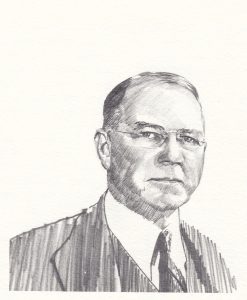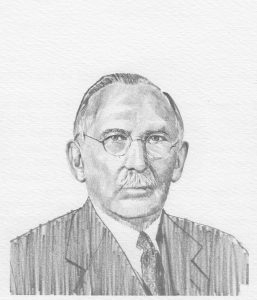Barrett Clinton Shelton, Sr., was a man who changed with the times and, in the process, helped to change the times.
During his sixty years as editor and publisher of The Decatur Daily, he dedicated himself and the newspaper to promoting and working for the best interests of the people in Decatur, in the Tennessee Valley, and in the State.
Barrett Shelton did not build Decatur, Alabama. But none can question his significant leadership in changing it from a struggling river town into a major industrial center in the New South.
Son of William Randolph and Margaret Clinton Sheppard Shelton, Barrett Clinton Shelton was born in Columbia, Tennessee, on September 3, 1902. In 1911, his family moved to New Decatur where his father published the first issue of The Decatur Daily on February 26, 1912. Young Barrett began his journalistic career as a paperboy for this paper which served the “twin cities” of “New” Decatur and “Old Town” Albany. (In 1927, as editor and publisher, he would be instrumental in effecting the consolidation of the two towns.)
It has been reported that Barrett’s journalistic career was almost “nipped in the bud” by his father. The youngster, a good and enthusiastic athlete, did not cover his paper route one day because he stopped to play ball. His father would have fired Barrett had his mother not intervened on his behalf.
After graduating from Albany High School in 1920, Barrett Shelton attended Washington and Lee University. When his father became ill in 1923, he returned home to help with the paper. After his father died in 1924, twenty-one-year-old Barrett became editor and publisher of The Decatur Daily.
Quite early, Barrett Shelton’s philosophy for building a good community became apparent in his operation of the newspaper and in his participation in community affairs. In his newspaper and in his life, he exhibited his belief in positive thinking to achieve good health, good education, and good jobs for the people of the community. And he believed the people could achieve these goals without interference from the government.
Barrett Shelton and his paper began to assume leadership roles in the community, for as he once said, “If you can’t give leadership, the community is just going to sit down and do nothing … (but) “People will follow you if you lead in the right direction.”
In 1928, he organized and was the first president of the Junior Chamber of Commerce, which was successful in establishing a baseball league and the area’s first airfield, though unsuccessful in luring stable businesses or industries to Decatur.
When the Great Depression came, Decatur was hard hit, because its one industry (L & N Railroad Shops) closed, and its one crop (cotton) was selling for 5¢ a pound. The land was selling for taxes; the people were ill-housed, ill-clothed, and out of work. Barrett Shelton organized a new Chamber of Commerce and became its first president (and served as president four other terms).
He and other members of the Chamber set about in earnest to try to alleviate the plight of Decatur’s economy. A committee sent to Moultrie, Georgia, where no farms had been foreclosed for taxes, came back with a concept that the Chamber and The Decatur Daily championed for years-“Balance agriculture and industry.” They wanted Decatur to have cash markets every day of the year for every farm product that could be grown in the area. They determined that Decatur must develop its own farm processing plants. They would welcome industry, but not wait for it to come from outside.
The “river pirates” (as Barrett Shelton and the other business leaders who spearheaded Decatur’s development came to be called) persuaded a local icehouse to create a packaging facility for pork and beef. Through creative local financing, they helped develop a milk processing and cheese plant. These ventures were a beginning for assuring year-round income in Decatur.
Then the Tennessee Valley Authority entered the picture – an intrusion, thought Barrett Shelton and other business leaders, at first. At their first meeting with David Lilienthal, a member of the first TVA Board of Directors, the businessmen were almost hostile in their attitude of: “You’re in command. What are you going to do?” Lilienthal’s reply was essentially, as Barrett Shelton later reported the conversation, ”I’m not going to do anything. You’re going to do it.”
‘The Old Man,” (as Barrett Shelton was affectionately and respectfully called for many years) and other hard-working businessmen took advantage of the tools of opportunity provided by TVA; and they “did it.”
Barrett Shelton, once an enemy of TVA, became one of its staunchest supporters. In 1949, upon request, he related the story of TVA to a United Nations conference in New York. He told of how Decatur and the Tennessee Valley had benefited.
Flood control helped to save the land and the diversified crops which the group encouraged farmers to grow for sale to the increasing number of processing plants in Decatur. The TVA project also helped combat and control malaria – healthier workers became more productive. A now navigable river provided more economical transportation. The combination of all these factors helped Decatur utilize its own resources as well as attract and keep new businesses and industries.
Barrett Shelton always considered the newspaper as family and the community as a larger family – and he could not do enough for it. For example, he organized the Decatur Community Chest, which evolved into today’s United Way. He used his newspaper to help raise local money for Morgan County Meals on Wheels when federal funding was cut. He was a deacon and elder of the First Presbyterian Church.
He served for eight years on the Decatur Municipal Utilities Board. He was president of the Tri-County Appalachian Health Planning Commission. He was the first chairman of the Tennessee River Valley Development Association, formed to support TVA and industrial development in the Valley. He was a charter member of the first Tennessee-Tombigbee Waterway Development Commission.
Barrett Shelton’s many and varied contributions are reflected in the honors he received through the years: 1969, the Medical Society of Alabama’s William Crawford Gorgas Award for his help in improving health; 1972, the Alabama Rural Electric Association’s Eminent Service Award; 1975, Troy State’s Grover C. Hall Memorial Award for most outstanding performance by an Alabama journalist; the Audie Murphy Patriotism Award; Morgan County Young Democrats’ Democrat of the Year Award; 1976, induction into the Alabama Academy of Honor; 1981, TVA’s Tennessee Valley Distinguished Citizen of the Year Award; 1983, the Distinguished Service Medal of Alabama. He was also awarded honorary degrees by The University of Alabama, Athens College, and the now-defunct Bernard College.
Barrett Clinton Shelton, Sr., died in a Birmingham hospital on April 22, 1984. His wife, Suzanne Jones Shelton, died less than three months later. The Shelton’s are survived by a son, Barrett Shelton, Jr., now publisher of The Decatur Daily; a daughter, Suzanne Shirley, co-owner of Steve Shirley Gallery of Homes in Decatur; and five grandchildren.
On April 22, 1984, only the words, “Barrett Clinton Shelton, 1902-1984, editor-publisher,” were printed in the otherwise blank editorial column of The Daily – only one of the many ways that papers from Mobile to New York City expressed how much Decatur, the Valley, and the State would miss “the Old Man.”




